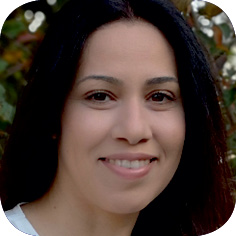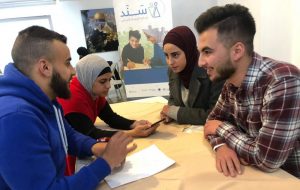“It felt so good to open my student account, and for the very first time, my tuition balance was clear. I had paid off all my fees. No loans or money borrowing! My parents can breathe a sigh of relief.”
Reem Shweiki, 23, Birzeit University
When discussing life challenges with people of my generation – those who are still in college or the ones who have recently entered the workforce after university – we come to a consensus that employability and lack of practical competency are frequent topics that we have learned to repeat without realizing how complex and elusive they might be. We broadly relate this reality to the abilities we have developed in the past and to our own projection of an abstract, strategic future as a recurrent concern! These are frequent statements shared with the international community which triggered a UNDP project initiative to strengthen the resilience of young people.
UNDP, supported by Austria, Sweden, Finland, and Norway, introduced and explored an innovative approach called SANAD to address some of the recent challenges that Palestinian youth face and in particular to promote the integration of social responsibility into education to allow youth to transition to employability and self-sufficiency.
UNDP and its partners introduced a new common reference framework associated with the shift from education as an academic institution to education as a social entity. Scholarships were offered to students from Palestinian universities, conditional on the completion of several working hours with young students (ages 8 to 12) from schools in East Jerusalem. Selected university students were trained as mentors. In order to acquire the necessary mentoring skills, training was focused on intensive capacity-development competencies in math and English tutoring and psychosocial support.
A SANAD scholarship is unlike any other form of financial aid. It lays the foundation for collaboration that would require universities to teach students the necessary skills for entering and adapting to the demands of the labor market, governments to nationalize such innovative models, the public/private sector to participate in allocating resources for student training, and youth to be socially aware of how important they are in contributing to society and to the future Palestinian state.
Youth play a fundamental role in the development and state building processes. Palestinian youth (aged 15 to 29) currently comprise 30 percent of the population in the occupied Palestinian territories, with one-third unemployed and nearly half with college degrees.* This can be seen either as a challenge or a great opportunity for the future. If Palestinian youth were to receive quality access to education and economic opportunities, their potential would lead to significant growth for the State of Palestine as a whole. Such youth civic engagement and the creation of a nexus between education and employability could be the answer to address the issues that Palestinian youth and children are struggling with.
SANAD started with the acknowledgement that the problem is not only in the education system or in the lack of financial resources, it is also related to the absence of the role of the youth as engaged actors in civil service. If youth participation in service provision could be systematically encouraged and supported, it would strengthen the link between formal education and the world of work.
“This scholarship is not about access to cash only! It offers that sense of commitment and accomplishment that I really lacked. Sameeh, the nine-year-old student I mentored, looked up to me, so I had to be responsible. I think I was Sameeh’s role model!”
Sundos Faraj, a third-year student at Al-Quds University
After the first year of successfully implementing SANAD, we can proudly confirm that the creative potential of empowered Palestinian youth is evident. And now you know how Reem Shweiki was able to pay off her tuition debt!
Reem Ghattas is a program manager at the Austrian Representative Office.
*Salto-Youth, Youth work in Palestine and surrounding challenges, 2013, available at
https://www.salto-youth.net/downloads/4-17-2946/Work%20in%20Palestine%20%28site%29.pdf.



